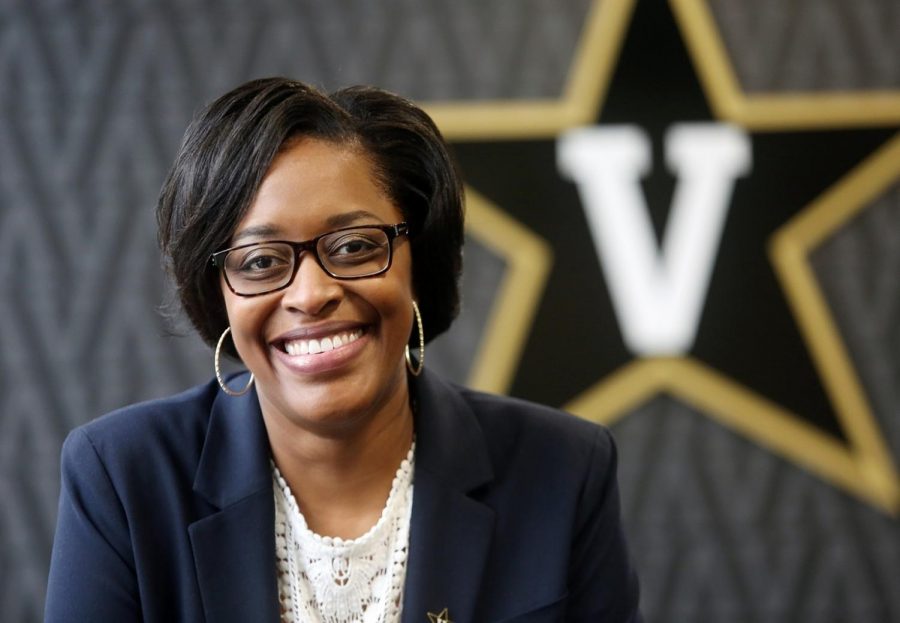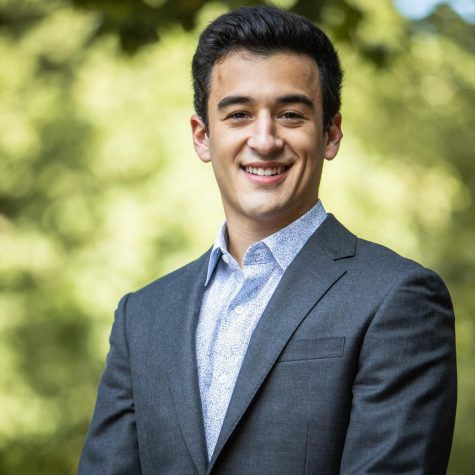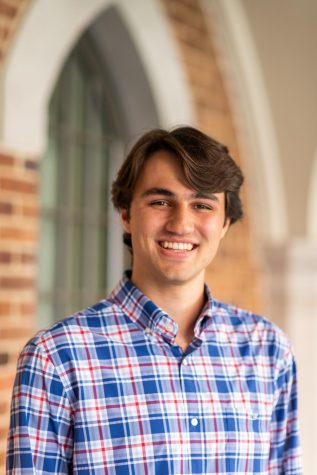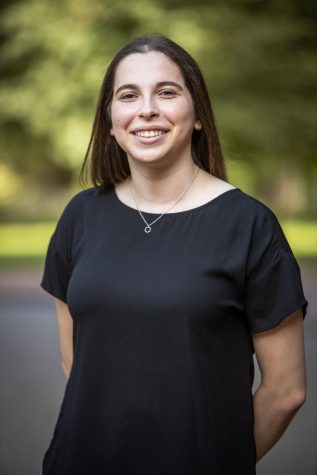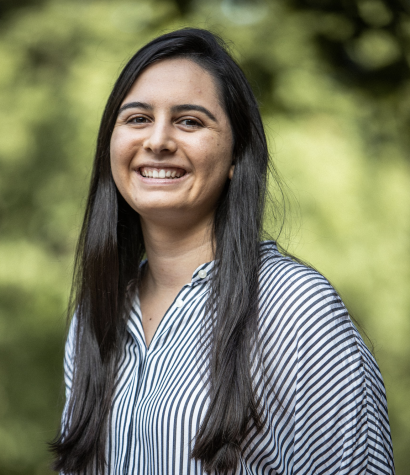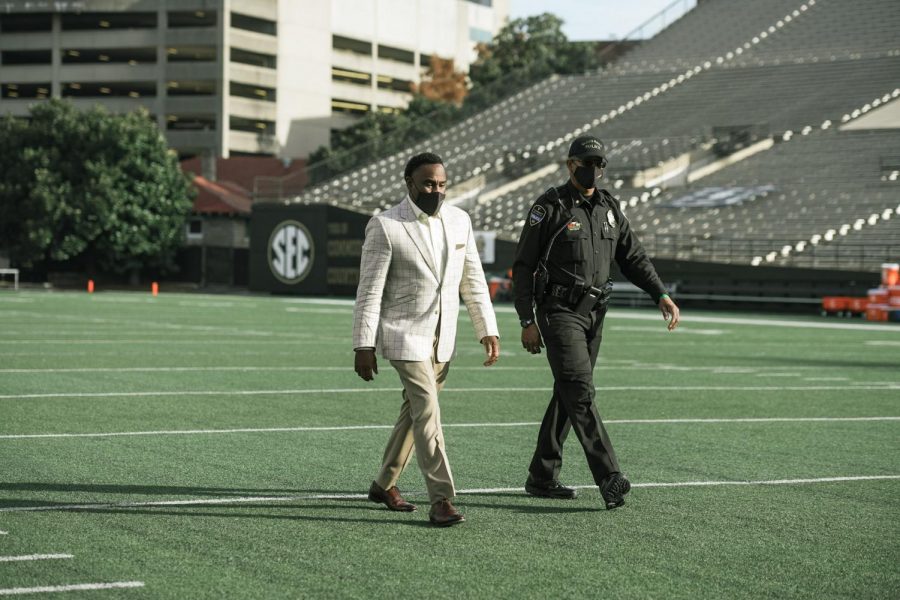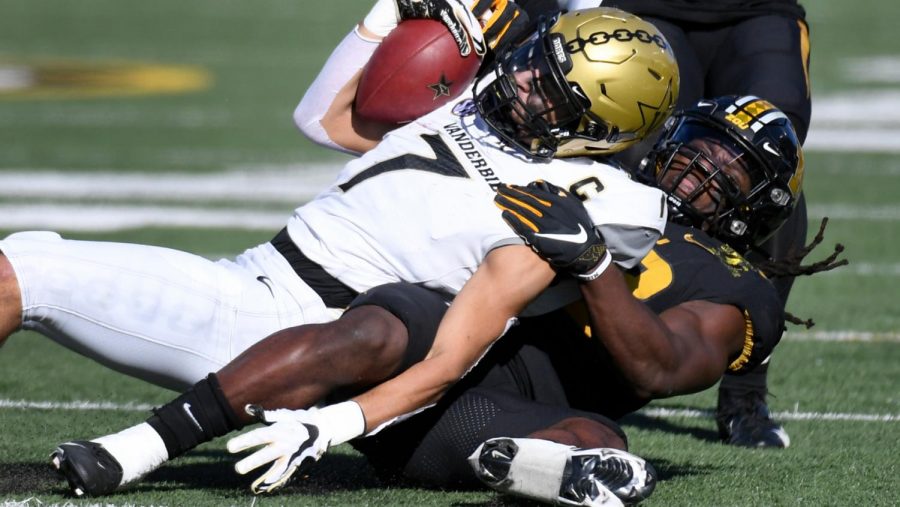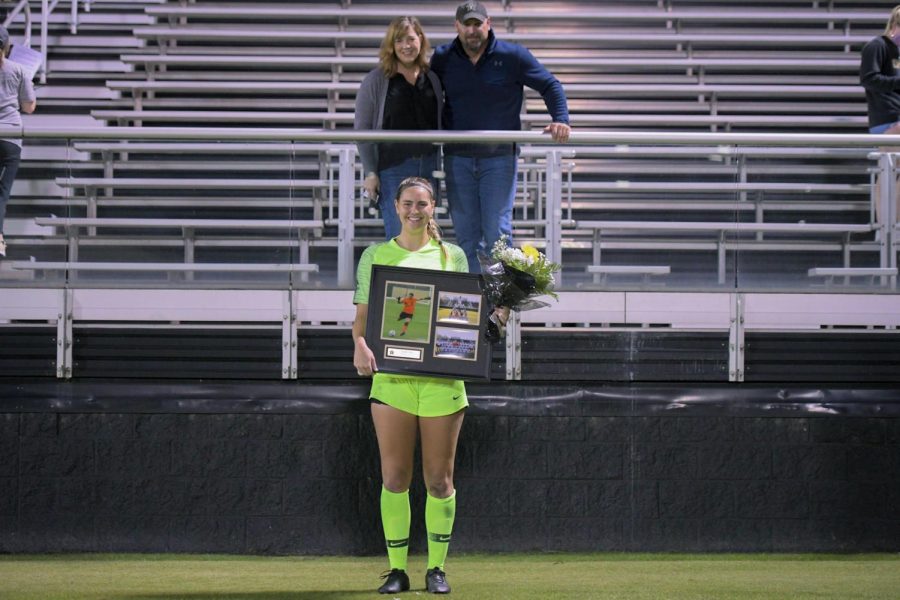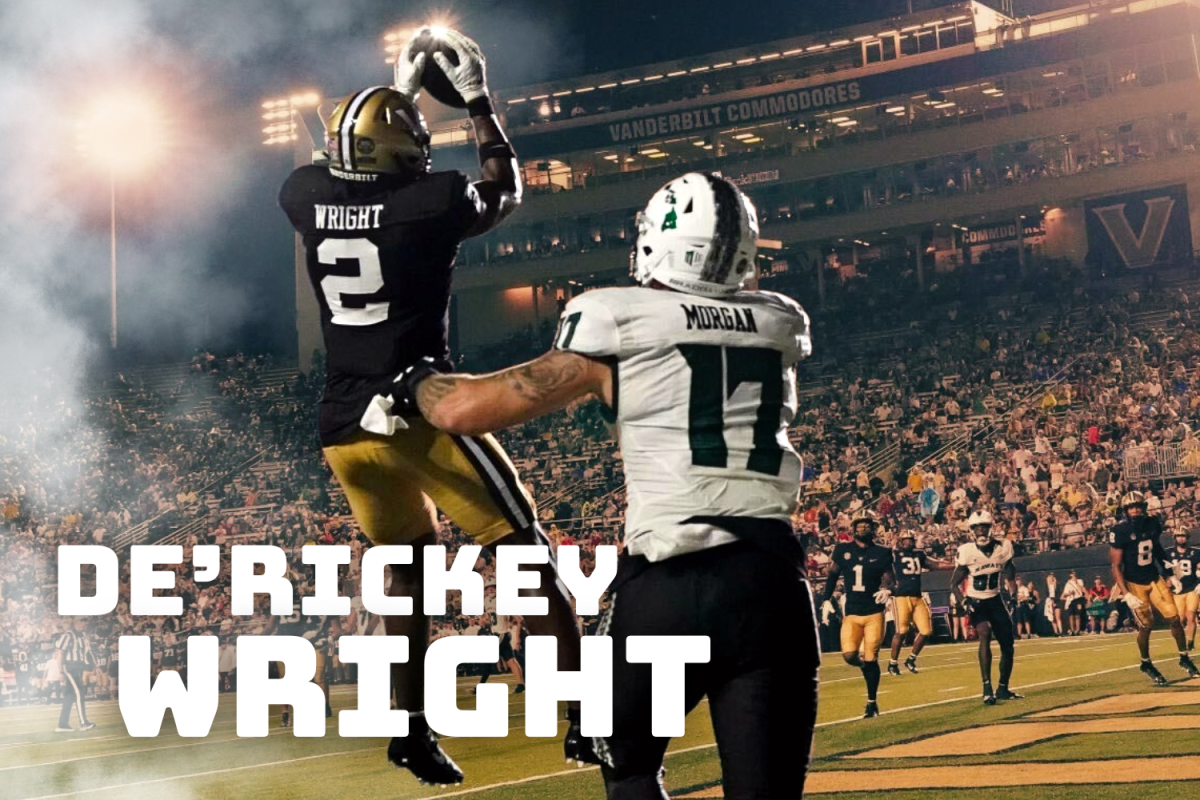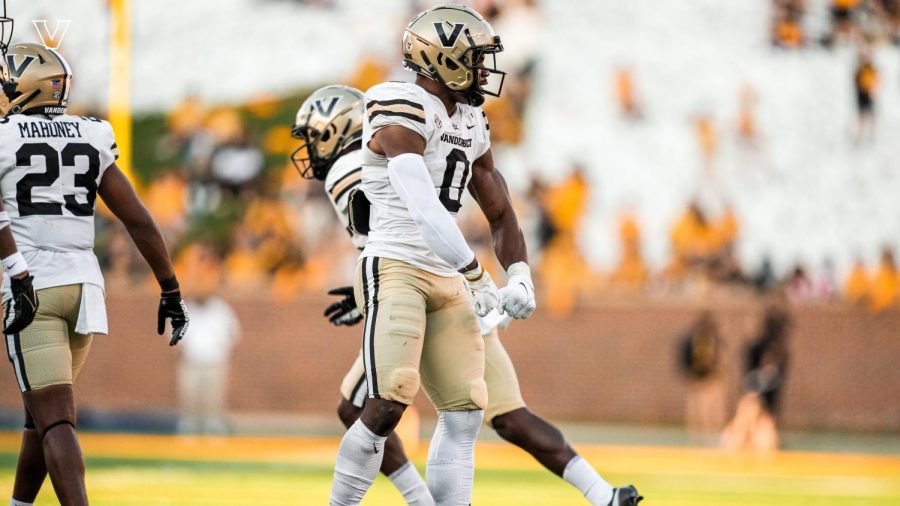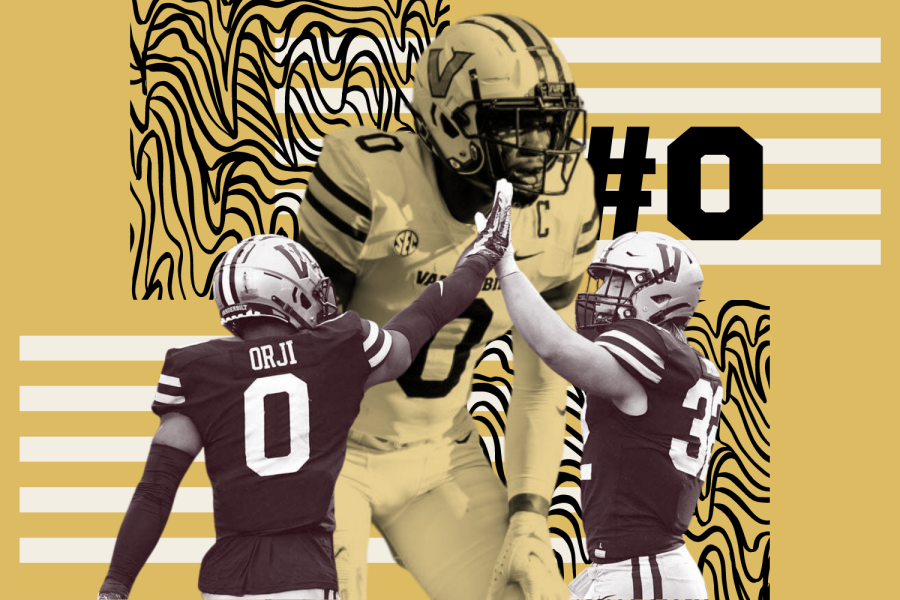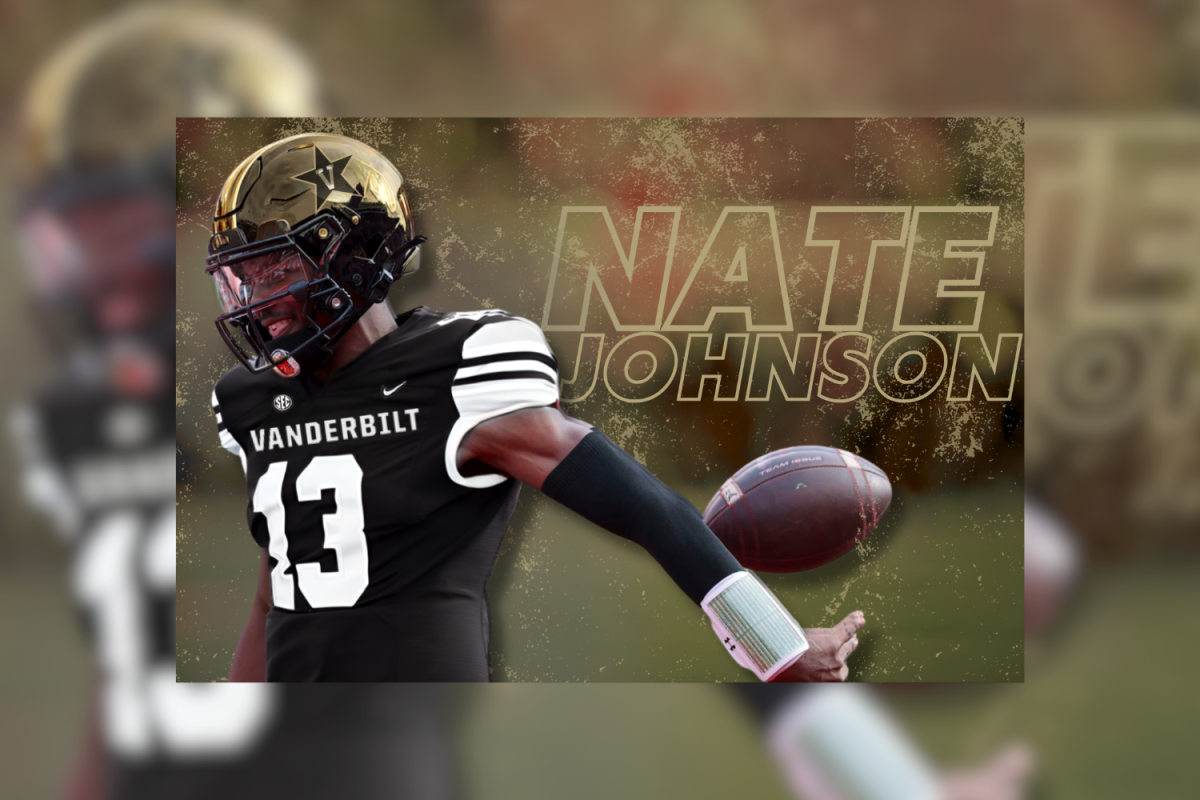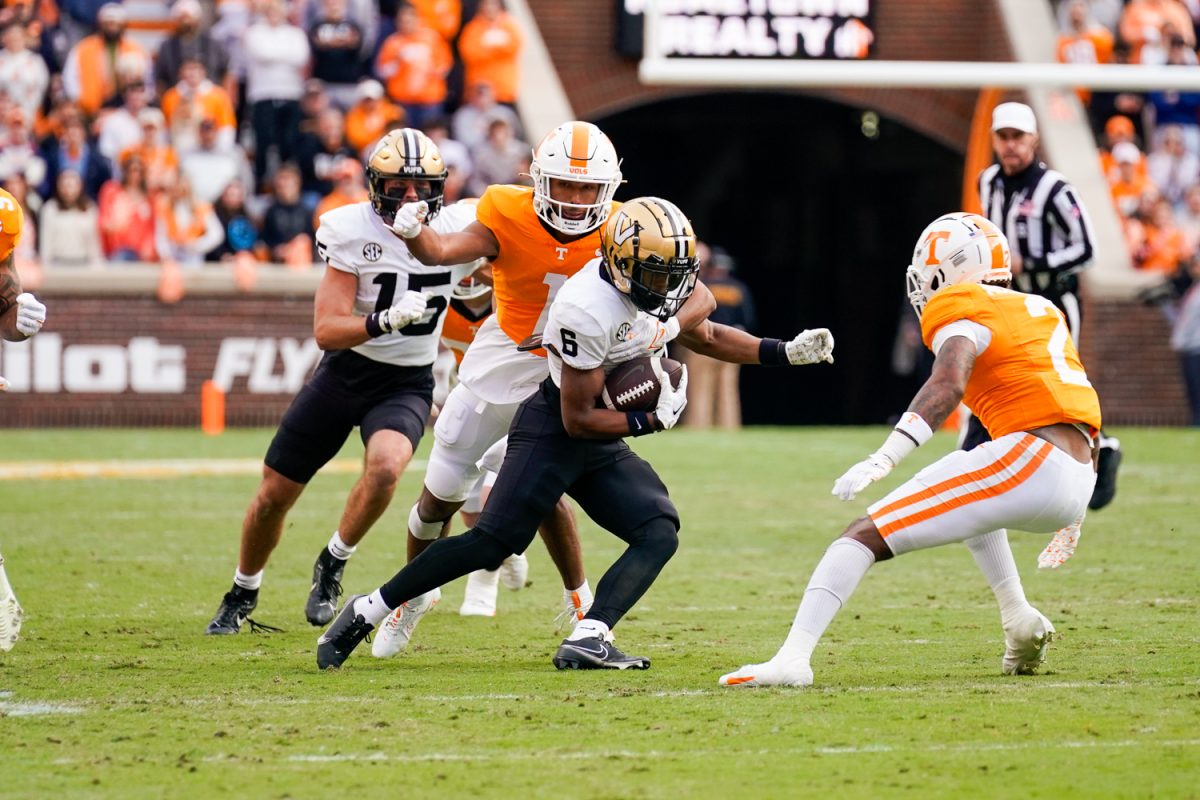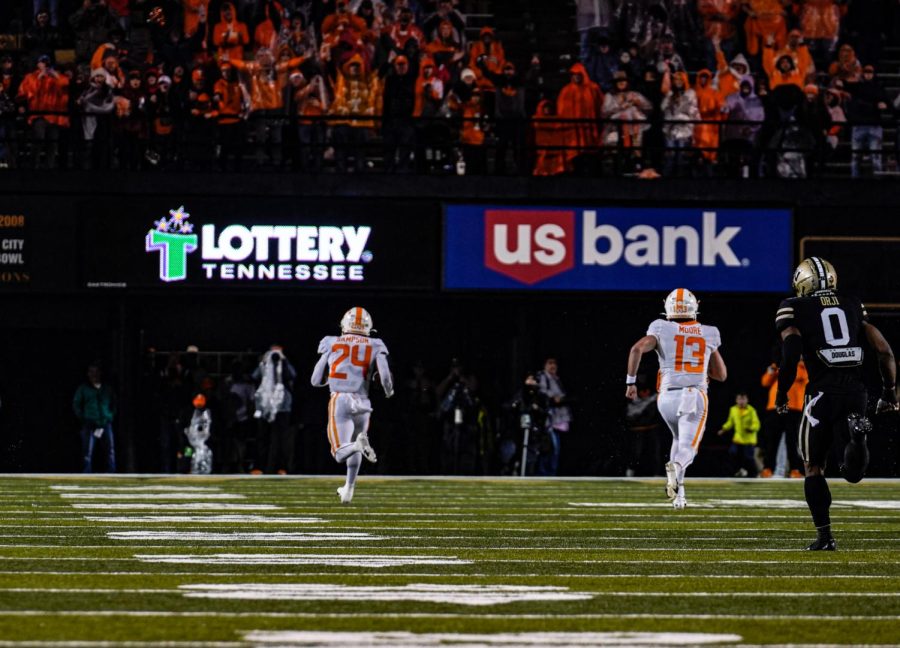One day after firing head football coach Derek Mason, Vanderbilt athletics director Candice Storey Lee held a press conference on Monday, Nov. 30. Lee discussed a variety of topics from what went into the decision, what she might look for in a new head coach and why the Vanderbilt head coaching job should be an attractive one.
Opening statement
Candice Storey Lee: I first want to use the opportunity to just say how much I enjoyed working with Derek Mason. He’s a fantastic ambassador for this university, a great community servant [and] a great leader of men.
I think for all of us in leadership positions who have to make decisions that affect people, it does affect a number of people. That was a challenge, but I know that it was a move that needed to be made. And as uncomfortable as it was, it was the right thing. I think that even the way that we carried it out I think it was symbolic of the way that I would like us to do business, and that’s being transparent, being respectful [and] treating the individual that’s impacted—in this case Coach Mason and his staff—with respect.
After I communicated with him what the decision was, he had an opportunity to speak with his family, then speak with the staff. Then, he and I together went and spoke with the team. I think that that was important. I think it’s a symbol of how I would like us to go about the business. I appreciate his tenure.
Yesterday was about taking care of home, so making sure that our student athletes, our commits and our staff understood where we were and understood that decision. Today is about pivoting to the search.
What are you looking for in a head coach, is it head coaching experience, coordinator, college, pro? What sort of requirements do you want to look for?
CL: I want to be open. I have learned over time, [if] you come in with a set list,what you don’t want to do is miss out on potential candidates because you’re narrowing your focus. I would say, though, that a demonstrated ability to run a program [is important]. I think having been a head coach is something that I am interested in. It is not a deal breaker. But I do think that given what we are trying to accomplish.
I think it’s important for me to say this: in the release yesterday, [it] did not talk about what we were looking for. Because I think part of the challenge there is that I did not want to genuinely talk about everything Derek Mason had done here and how much I appreciate him, and in the same breath talk about what we’re looking for in a coach because people will sort of say ‘Oh, well that means he didn’t meet that criteria, or you’re saying that’s different from what he was,’ As I told our staff this morning, two things can be true. Right, so you could check some boxes, but it’s still time for a change. I was really careful yesterday not to talk about what we were looking for because I do not want people to make the leap that that’s not what we had. Things are far more complicated than that.
[An] Offensive-minded [coach] is something that I’m interested in. Certainly, it doesn’t mean that you have to be. If you’re not an offensive coach, then certainly who is on your staff and the style of play is going to be very important. [We’re] always looking for someone who aligns with our values and first and foremost wants to be at Vanderbilt.
I have to say this: When I made the decision—and it was my decision—what had to go into the thought process was, ‘How do we prepare for the future?’ I think we’ve got alignment, and I use that word very deliberately, we have alignment that starts with Chancellor Diermeier, and I know that I have a partner there. You have some additional confidence in making the decision because one, I have to do what I think is right, but two, I have a partner that I know that is going to position this opportunity for success. The successful candidate will have to understand the importance of alignment. For us, alignment also includes the culture within this building: someone who is a collaborator, someone who understands building community. That’s important to be successful at Vanderbilt.
Obviously, [we want] someone who’s committed to student-athletes and the student-athlete experience. I talk about the student athlete experience a lot, but that includes winning. When I think about being a student athlete, I don’t know if I would have had as good of an experience if we had not gone to the Elite Eight twice, if I did not know what it was like to be a No. 1 seed in the NCAA Tournament. It makes a difference. I want these kids to experience that and experience it at a high level. We’ve got some work to do to make sure that that’s the case. But I want somebody who is up for that challenge and understands that it can be done, and it can be done here.
Candice, I think a lot of people were surprised that this happened before the end of the season so why now?
CL: There’s some complexity that comes from COVID. I know we’re all experiencing it in our own ways. So if you think about the timing, if this was not a COVID year, Saturday would have been the end of the regular season. We know that the timing of the season adjusted. We started later than we normally would. Some of [the SEC is] going to play through Dec. 19.
What didn’t change though was the early signing period [for recruits]. I think Dec. 16 is the date for the early signing period. That calendar was not adjusted. Thinking about wanting to run a process that’s above reproach, I did not want for our current student athletes or for our prospects to not have as much clarity as possible and as soon as possible. That really is where the timing comes from. In a COVID world, one of the first things I said to our kids was that as long as we had student athletes who wanted to play, my job is to provide the healthiest and safest environment [and] to minimize disruption so they can focus on what they want to do and what they came here for. I wanted to manage the disruptions as much as I could. So that’s another reason for trying to go as late as possible.
Candice, with this search are you going to use a firm? How is Vanderbilt and you going to approach this particularly in COVID? I’m thinking interviews will be mostly Zoom. Do you want to be in a room with somebody before this final decision gets made? And then how quickly do you want to have a new coach on the ground, hired before that signing period starts?
CL:We will use the assistance of a search firm to help facilitate this process. I was part of our last two football hires and having a search firm is helpful. Having some more hands on deck to just help coordinate. Search firms do not pick your candidate but having the hands is really important.
I think at the end of the day, being in the room with a person that you’re bringing into your community in this sense, that’s important. So, I used the search firm for my Deputy AD hires and Zoom was very helpful. But looking in the eye, being in the room, that’s important too. And I don’t want to sacrifice that. In terms of timing, I reached out to all of our commits and spoke with their families yesterday, and I said from a timing standpoint of course we want to move as fast as we can. I’m not gonna sacrifice quality for speed, but I can’t say it’s out of the question to have a coach prior to signing day. But that may not be the case. We’ll do it as quickly as we can.
With this candidate, do you take into account salesmanship? Energy with things you guys want to do in terms of raising money and all those things. Is that part of the interview process, part of the consideration? How do you evaluate that, is that something you’ve thought about or am I just coming out of left field with that?
CL: No, I don’t think you’re coming out of left field. I think you start with who is the best leader of the young people for your program. How you check the boxes of best ambassador? To me, it starts with serving student-athletes. But there are a lot of boxes that need to be checked as we think about how we position ourselves for the future. So, someone who can engage with the community, who has charisma and who can inspire, those are important. Part of being a good ambassador here is being able to engage. And you’re absolutely right. We’re planning to do things that, quite frankly, we’ve never done before. We’ve got some gaps in the community to fill. We need to be a little more forward in talking about who we are, a lot more forward. Obviously, our head football coach is going to be a very important part of that. So, it’s a good question; it’s absolutely something I’m looking for.
To follow up real quick, the person who comes to mind to me is James Franklin. From the outside looking in, he was obviously huge in getting the indoor facilities built. Are some of those qualities what you’re hoping for here with this hire?
CL: Every coach that I’ve worked with, I think you can take some great things from them. When I think about our last three football coaches, I have good relationships with all of them. I guess you could say the last four if you include Robbie Caldwell. But the last four football coaches, we’ve got great relationships, and I think there are pieces to take from each of them that I would be looking for.
When Malcolm Turner made the decision last year to retain Derek, he cited a desire to use some of the resources that would’ve gone towards a coaching change towards things like facility improvements that he thought the program needed. The pockets aren’t any deeper now than they were then with everything going on, how do you feel about the financial cost of making a change relative to what it could mean for other things the program would need moving forward?
CL: I would start by saying that when I think about my predecessors, I have to believe that they made the decisions that they thought were best at the time. I can completely understand where Malcolm was [coming from]. I would never try to speak for him, but I believe he felt that it was appropriate to focus more on infrastructure. And I do not think that that’s wrong. Part of this commitment to putting our football program in position to succeed means that I have to make sure that the infrastructure is there.
As I sat down, this was a very deliberate decision, and certainly there is a cost to making a change. And perhaps there’s a cost to not making a change. When we think about the COVID world, I know that the financial impact is something that everybody is wrestling with across the board, across industries. I’ve said from the beginning that, first of all, I certainly hate that we are in this situation. Nobody wants to be dealing with a global pandemic. But the reality is that it’s time for us to be creative. If there are opportunities to close the gap as an athletics department and as an institution, then we need to do that. Part of this change is giving us an opportunity to close the gap, put ourselves in position to succeed. So, yes there’s a cost. But as I think about what we’ve been doing in conversations with donors, as we prepare for a facility push, as we prepare for what’s to come, we’re in a good position to do exactly what needs to be done so that this program can be successful. And that’s part of the responsibility. There is an institutional responsibility without a doubt.
To follow up, just in terms of the on-field performance of the team, when did you get to a point where you felt that change was needed? Obviously, the schedule has ten SEC teams that are dealing with all kinds of issues with COVID. Did it make it tougher to make this decision given that there were some pretty good excuses?
CL: At the end of the day, what you’re describing is one piece of why this was complex. We are in the business of winning. That is a part of it. It’s not the sole reason for the change, but we do play games to win. And so winning is a part of it, and we can’t be afraid to say that. I’m not going to point to a specific game or play, and it wasn’t just about this moment. I think the last time that we were all together I talked about constant evaluation. That’s not just about a certain week, or certain part of the season. This is where all those dynamics have to be thought through, and it was just time for a change. Vanderbilt can’t be afraid to talk about the importance of winning.
And when I talk about two things being true, you can be committed to student-athlete experience. You can win and win at a high level. You can be a highly academic, selective institution. We can operate as a charter member of the SEC. All of those things can be true. It’s not just one thing.
Do you take into account the strengths and weaknesses of the current roster when you are looking for a new coach?
CL: Certainly from a candidate standpoint, when you have a candidate in front of you that is able to assess what we have, [that is important]. Because that will be a question in thinking about our current roster, how you can maximize it. It’s a good opportunity for me to say that the cupboard is not bare, and we have some talent in our program. There’s no doubt. That’s a credit to Coach Mason and his staff. So from an interview standpoint, it’s how to maximize it. That’s a strategic question that will be a part of the consideration.
I know the facilities are not public yet, how do you handle that piece? Are you able to show candidates plans or make them promises? How do you handle all the questions about facilities coaches will have without having a public plan?
CL: As I think logistically about how we execute this search, I have to be able to talk about the future. Not just talk about [it], but show them. I am going to be transparent with our candidates about where we are going. There is a reason why you publicize things at a certain time or in a certain way, there is some strategy behind it. I know that can be frustrating for fans at times because they are eager to see and I love that everybody is chomping at the bit because it is actually something to be truly excited about. I am not going to just get in front of a candidate and say ‘just believe me,’ I have to be able to show them. And if they are a legitimate candidate, they should want to know, they should want to be crystal clear about what they are walking into. The pressure is on me, me and our team to make sure we are very clear with them about where we are going, what we are committed to and what resources they will have to succeed. If I wasn’t able to do that, I’m not sure I would have felt as confident making the change.
Todd Fitch takes over in the interim, is that a name that is going to be a part of the search conversation moving forward?
CL: I felt very comfortable in naming Todd Fitch as the head coach.Part of that is just my own observation,watching him and how he has carried himself. But also Derek has talked a lot about the strengths of his staff, and I knew what Todd brought to the table. I am not going to speak publicly about candidates. I would say that Todd Fitch is our interim head coach and has an opportunity to lead this team.
How do you properly evaluate what a winner looks like? Is it all about record? What are some of those qualities?
CL: We all know that there is a risk in hiring. You have to do your best to mitigate risk. So if you can check the boxes of someone from a values standpoint, who has a demonstrated commitment to student development, who has a demonstrated record of winning or being connected with winning programs. Can I guarantee every single thing? No. But I do think there are things you are looking for and sometimes you don’t know it until you see it. I really do pay attention to my gut, but I do think that demonstrated record of success is important. On paper, that might be what gets you to the first round. But the next is how do they connect, how do they communicate, can you see them leading young people, can they be an ambassador for this place, are alumni going to gravitate to them, are they going to help us reach our goals? Those are the questions I am asking myself as we sit and vet candidates. There are a lot of ways for us to get to winning, and I have to make sure I pick the best way.
What can you learn from Tim Corbin as far as building a program of success at Vanderbilt?
CL: Oh, quite a bit. I think it’s obvious Tim is the prototype. The right leader who creates the right culture, you provide the research, be smart enough to kind of get out of their way. I would say that Tim Corbin has created the template. He and I talk often, and I have also had the benefit of watching how he built his program. I remember being a student here; and there were a couple sets of bleachers out there at Hawkins. We now have the best baseball program in the country, and it’s not an accident. It was methodically built, and we are fortunate we have that resource and that example and that partnership right here. So the template is there, and that’s certainly a great benefit for us.
Why is this an attractive job for a candidate?
CL: If you were building an athletics department from scratch, the good part here is that it checks a lot of boxes because you would say ‘I want to be in a great conference,’ check. ‘I want to have access to talented student athletes,’ check. ‘I want to be in a great city,’ check. ‘I want folks that are committed to developing young people,’ check.
The thing we also have is alignment. Because we have leadership from the very top that says, ‘I believe in that.’ Sidewalk fans call it Kirkland, the building which also seems to represent the establishment. And there have been all of these criticisms of Kirkland. I am telling you we have alignment from the very top, from the Board of Trustees, from Kirkland, from Chancellor Diermeier that says ‘we value athletics as an important part of this institution.’ It creates tradition. It creates camaraderie. It creates leadership. It creates an opportunity for this community to be engaged. It gives us an educational experience outside of the classroom. It gives alumni something to rally around. We have alignment because everybody here believes that, and we have an opportunity to put our money where our mouth is.
That’s not a commentary on what it was before. I wasn’t the athletic director, so I wasn’t in every conversation, I don’t know. I know what some of the criticism has been and perhaps well earned, but I am telling you right now that it’s a great job because we have alignment across the board. We have an opportunity to compete in the greatest conference in the country so when you walk around here and see on the wall ‘The Degree, The City, The SEC,’ check, check, check.
Now we have a chance, if perhaps that wasn’t the case before, to actually show that we are serious about this commitment. Investing in athletics does not take away from the academic caliber of this institution. It’s why we all want to be here. It is the thing that drew me to Vanderbilt years ago and the thing that kept pulling me back. We have the opportunity to create a niche and do something special. All good coaches have a little swag about them and if you are up for the challenge, you have an opportunity to do something here that perhaps has never been done in a space with alignment, with leadership that supports that. That’s why it’s a great job. And our young people are amazing. That’s a privilege to get to coach young people, but especially to get to coach Vanderbilt’s young people. They are tremendous.
With that being said, is it fair to say that maybe this is a defining moment and a defining hire for Vanderbilt athletics?
CL: Absolutely. But I’m going to tell you in my mind that every single thing that we’ve done—listen, I know I’ve only been the athletic director since May 21, but considering what we’re trying to do, every decision is a defining moment. This is the biggest, sure. In this short time, this is the biggest. But everything that we do, I think that we’re trying to send a signal. Because we’ve got to change—we’ve got to attack the perception. So yeah, it’s defining, but so are several other things that we’re going to do, that we will do, that we have done, that we’re doing.
I’m curious about your thought process about making the decision on Sunday with the Sarah Fuller story on Saturday, knowing that if you did this on Sunday you may set up back-to-back of the two biggest stories in the athletics department this year.
CL: I certainly understand why you’re asking the question because I think Sarah Fuller has more social media followers than all of us times ten. The attention and the national recognition that she’s gotten is just tremendous. But these are two separate issues. And I’m not naive enough to think that one doesn’t connect to the other from a media standpoint, or that if you were sitting in a communications class you’d be like ‘well, you wouldn’t do it on this day.’ I understand that.
I’m glad you brought up Sarah Fuller, because it’s interesting. One of the things I’m so proud of is that there wasn’t a person around here that thought it was really a big deal. That’s not to diminish what Sarah did. She was a trailblazer; she made history. That’s not to diminish that. I think when I heard about it, and they came to my office and told me that Sarah hit however many field goals and that she tried out, I thought, ‘well, that’s cool. Better make sure she gets cleared through compliance.’ That is literally all I thought. It’s not farfetched to think that someone who can kick over there can kick over here.
She’s a student-athlete, and she’s getting tested, and she’s 6-foot-2 and a great athlete. I didn’t even think about it. It’s interesting because I don’t think any of us thought of it. That’s a testament to Derek Mason. I guess he thought, ‘why not look right there?’ And it wasn’t a big deal. It wasn’t about breaking barriers. It was about making sure we had another kicker. And then it turns out that everybody who was involved said this is the right thing. The world ate it up, and that’s wonderful for that young lady. She’s doing a fantastic job. But it wasn’t about that. That’s totally separate from it being time to make a decision. We’ve got to think with a long view in mind. It’s never a bad time to make a tough decision. It never feels good, but you sit in the seat because you’re asked to make decisions on behalf of the greater good. Because this program is bigger than any one person. So I understand that it was back-to-back Saturday and Sunday, but the two things are not connected. Both things are true.
After speaking with both the current team and current commits, how did those conversations go and how confident are you that you’re going to retain the majority of them throughout the coaching change?
CL: As you can imagine in speaking with the team, it was tough. It was tough. Just in looking at their faces and having some one-on-one conversations, people were experiencing a range of emotions. I even thought about it myself, as you think about the relationships—because this gives us the opportunity to build deep relationships—when change happens, it’s going to hurt. At the end of it, you get some amazing experiences and connections, but it’s going to hurt. I absolutely empathize with how everyone was feeling, so it was tough. How confident am I in retaining the current team? I certainly hope that I’m going to do everything I can, as is our staff that’s still working. We have a complete staff here, and they’re preparing to play Georgia.
Again, it is my hope that these kids understand that finishing what they started, which was part of the messaging to them yesterday, is really important because this is a test of our character. Doesn’t mean that if you feel like you can’t do it, you have a character flaw. Doesn’t mean that. Everybody’s got to decide that for themself. I don’t know what the next couple of weeks will look like, but I know that as long as we have young people that want to compete, we’re going to give them that opportunity.
When I talk to commits, it was about assuring them, affirming for them that Vanderbilt is committed to them. And it would be our honor and our privilege for you to remain committed to us. But part of the timing of the decision was to provide as much clarity as possible because that’s important. We want to have a process that’s above reproach, and that is as fair as it can be under the circumstances. So any time you make a change like that, you’re going to have attrition. Some that you expected, and some that you didn’t. You may also have folks that you didn’t expect who now want to be apart of your program. It’s just part of it. Those are some bumps in the road that we’ll have to overcome in the short-term, but again, we’re thinking with the long view in mind. I just told each of those young people that at the end of the day, as hard as it might be, we’re always going to make decisions that we think are in your best interest, and we’re going to continue to invest in you. That’s the job. That’s the responsibility. And I hope that they feel that.
This transcript has been edited for clarity and length.





